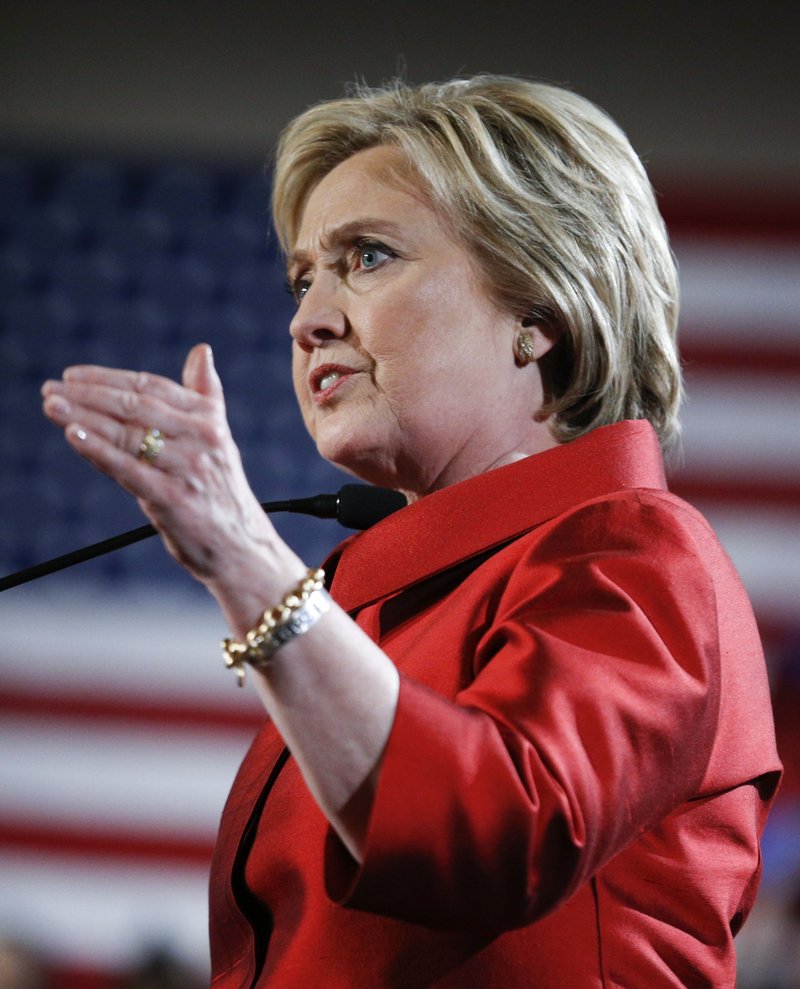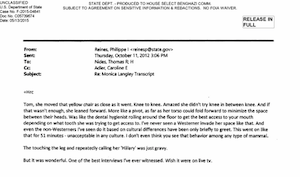WASHINGTON -- A federal judge ruled Tuesday that State Department officials and top aides to Hillary Clinton should be questioned under oath about whether they intentionally thwarted federal open-records laws by using or allowing the use of a private email server throughout Clinton's tenure as secretary of state from 2009 to 2013
FULL ELECTION COVERAGE
The decision by U.S. District Judge Emmet Sullivan of Washington came in a lawsuit over public records filed by Judicial Watch, a conservative legal watchdog group, regarding its May 2013 request for information about the employment arrangement of Huma Abedin, a longtime Clinton aide.
A State Department official said that the department is aware of the order and that it is reviewing it, but declined to comment further, citing the ongoing litigation.
Although it was not immediately clear whether the government will appeal, Sullivan set an April deadline for parties to lay out a detailed investigative plan that would extend well beyond the limited and carefully worded explanations of the use of the private server that the department and Clinton officials have given.
Sullivan also suggested from the bench that he might at some point order the department to subpoena Clinton and Abedin to return all records related to Clinton's private account, not just those their camps have previously deemed work-related and returned.
"There has been a constant drip, drip, drip of declarations. When does it stop?" Sullivan said, adding that months of piecemeal revelations about Clinton and the State Department's handling of the email controversy create "at least a 'reasonable suspicion'" that public access to official government records under the federal Freedom of Information Act was undermined. "This case is about the public's right to know."
In granting Judicial Watch's request, Sullivan noted that there was no dispute that senior State Department officials were aware of the email setup, citing a January 2009 email exchange including Undersecretary for Management Patrick Kennedy, Clinton chief of staff Cheryl Mills and Abedin about establishing an "off-network" email system.
The watchdog group did not ask to depose Clinton by name, but its requests in its lawsuit targeted those who handled her transition, arrival and departure from the department and who oversaw Abedin, a direct subordinate.
Sullivan's decision came as Clinton seeks the Democratic presidential nomination and three weeks after the State Department acknowledged for the first time that "top secret" information passed through the server.
The FBI and the department's inspector general are continuing to look into whether the private setup mishandled classified information or violated other federal laws.
For six months in 2012, Abedin was employed simultaneously by the State Department, the Clinton Foundation, Clinton's personal office and a private consulting firm connected to the Clintons.
The department stated in February 2014 that it had completed its search of records for the secretary's office. After Clinton's exclusive use of a private server was made public in May, the department said that additional records probably were available.
In pursuing information about Abedin's role, Judicial Watch argued that the only way to determine whether all official records subject to its request were made public was to allow it to depose or submit detailed written questions about the private email arrangement to a slew of current and former top State Department officials, Clinton aides, her attorneys and outside parties.
"We know discovery in FOIA cases is not typical, and we do not ask for it lightly," Judicial Watch President Thomas Fitton said before the hearing. "If it's not appropriate under these circumstances, it's difficult to imagine when it would be appropriate."
Fitton noted that the State Department's inspector general last month faulted the department and Clinton's office for overseeing processes that repeatedly allowed "inaccurate and incomplete" Freedom of Information Act responses, including a May 2013 reply that found "no records" concerning email accounts that Clinton used, even though dozens of senior officials had corresponded with her private account.
Justice Department lawyers countered in court that the State Department is poised to finish publicly releasing all 54,000 pages of emails that Clinton's attorneys determined to be work-related and that were returned to the State Department at its request for review.
The case before Sullivan, a longtime jurist who has overseen other politically contentious open-records cases, is one of more than 50 active Freedom of Information Act lawsuits by legal groups, news media organizations and others seeking information included in emails sent to or by Clinton and her aides on the private server.
The State Department has been releasing Clinton's newly recovered correspondence in batches since last summer with a final set due Monday.
Meanwhile, former Clinton department aides Mills, Abedin, Jacob Sullivan and Philippe Reines have returned tens of thousands of pages of documents to the department for open-records review, with releases projected to continue into at least 2017.
The State Department also has asked the FBI to turn over any of an estimated 30,000 deleted emails deemed personal by Clinton's attorneys that the FBI is able to recover in its investigation of the security of the private email server.
A Section on 02/24/2016

